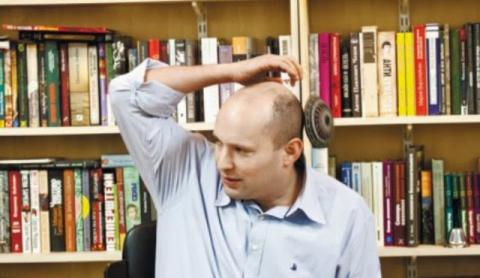Jewish Fundamentalism Is Beginning to Infect Israeli Schools
Bennett has presented this as an act of educational reform, just as he did when he proposed a blacklist of prohibited books. Nothing could be further from the truth. Bennett's statements arise out of a desire to impose parochial judgments that decide to which elements of culture Israelis should be exposed. These judgments, moreover, are presumably to be made by those whom the education ministry considers morally capable to choose what is appropriately educational and what is not. Crucially, but not surprisingly, missing in the announcement is who exactly these people might be. Whoever they are, I suspect they will not be among the great authors, playwrights, moral and cultural leaders of Israel who can be expected to view such censorship and moral control as inimical both to democracy and the free exchange of ideas.
Rather, this move reflects the narrowing of the permissible and the culturally valued that has increasingly been an expression of religious fundamentalism. The religious Habayit Hayehudi party which Bennett leads has, alas, been infected by such fundamentalism – which in the past was exclusively associated with ultra-Orthodoxy.
The assumption that a commitment to Orthodox Jewish practice gives one a kind of moral superiority and an understanding of what is right and wrong, not just in Jewish law, but in all spheres of culture, is just that: an assumption. The evidence for such claims, either by rabbis or those who present themselves as authentically religious, is however betrayed by the facts.
The Orthodox rank and file, its rabbinate, and its political parties, do not lack for those who have been found guilty of moral turpitude, crimes and misdemeanors. They certainly have no monopoly on knowing the difference between right and wrong. Among them are those who have engaged in violence and terror, and there are significant numbers of them who engage in and consume pornography and racism, as well as other moral crimes.
I would be very careful before giving them the power to determine what does not properly belong in the culture basket. Would they view some of the dances on stage, films in the theaters, or novels written through the prism of their private beliefs and try to impose these on all peoples, as fundamentalists do, or would they be able to recognize that in a democratic society, culture and art is created and transmitted by all of a society's people and not subject to social gatekeeping?
On the other hand, expecting bureaucrats and politicians or the local school principal to be the arbiters of what is or is not proper or high quality for public educational institutions would be no better. We have already seen a plethora of these people in Israel and abroad arrested and convicted of acts that demonstrate they are far from being legitimate moral leaders or cultural arbiters of right and wrong.
A democratic society, which Israel continually makes a claim to be, must be supported by the free exchange of ideas, opinions, art and the like. That freedom must be part of the education its citizens receive from primary school through university. It dare not become restricted by the religiously fundamentalist opinions and restrictions that are so much a part of the wider Middle East in which it is located. Israel's Ministry of Education is in danger of becoming the Ministry of the Permitted and the Forbidden - or the Ministry of What Is Not Education.
Samuel Heilman
Samuel Heilman holds the Harold Proshansky Chair in Jewish Studies at the Graduate Center and is Distinguished Professor of Sociology at Queens College of the City University of New York.

